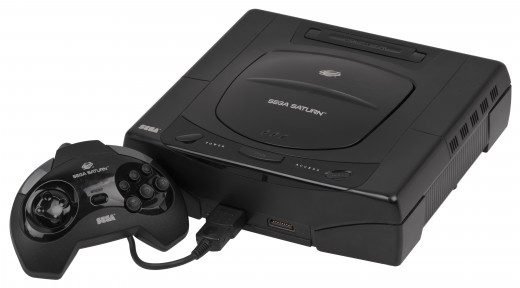Sega Saturn: It's Out There.

2D isn't 3D!
Let's go ahead and get this out of the way. Sega's only platform with true multi-region success was the Mega Drive/Genesis. Even then, they managed to taint that console's image with the 32X and (to a lesser extent) the Mega CD/Sega CD add-on. Sega of America had very poor communication with Sega of Japan. I sense that there may have been a power struggle somewhere in the smoke. Japan was ready to move forward with the next true platform, but the American division was still high on Genesis profits. I don't really blame the Sega CD for tarnishing Sega's reputation. It was launched early in the life of the console, and had below-average (but not terrible) sales.
Enter the 32X, and now you've got problems. I don't understand why they launched this thing in the first place when the true 32-bit platform was already supported in Japan? Then, to add insult to injury, instead of creating the 32X as a stand-alone platform (dubbed, the "Sega Neptune") which would have had backwards compatibility with Genesis games (a smart move) they decided to ship it as an add-on for the Genesis unit. I guess if you consider that people in the market for the 32X would most likely have been Sega fanatics in possession of a Mega Drive/Genesis, and that player's wouldn't have to purchase additional controllers or AV cables to use the system, then you could argue that they had a cool idea (albeit, terrible execution). Plus, if it's just an add-on then why does it require a separate power-supply?
When you combine the fact that the 32X hardly had a library of games (let alone games that took advantage of the new hardware) and was on sale for barely a year before it was discontinued, it just makes you wonder what kind of cigars those Sega executives were smoking at the time. Plus, with existence of the Saturn I fail to see a purpose for this peripheral to have even existed. Why would you want to spend $150 for a gimped 32-bit experience? I understand that Sega was offering the device as a cheaper alternative to the Saturn, but the 32X was nowhere even close to performing at or near the level of the Saturn.
After the failure of the 32X, Sega was now prepared to focus on the Sega Saturn as the true next-generation platform. However, in the beginning the Saturn wasn't intended for 3D-intensive games. The concept backing the Saturn was one where gamers could experience the most advanced 2D-centered titles with minimal 3D effects. It wasn't until after Sega caught wind of the PlayStation's hardware specifications & the impending launch of the Nintendo "Ultra 64" that they truly began to consider that the market may not be as interested in 2D-gaming as it was in the previous generation. In an effort to remedy this, Sega threw in a second processor for additional graphics processing. I'm not sure if both processors were actually used. Most reports I've read indicate that it was, in fact, never utilized. If someone can clarify this fact I would love to know in the comments section below.
Mirroring their 32X debacle, Sega jumped the launch date of the system several months earlier than originally intended and only dispatched systems to a select few retailers. This angered developers, who were still trying to finish projects that had to be cut-short and rushed to the market, as well as retailers who were not chosen to receive this "surprise" shipment of hardware. What on Earth was the purpose of doing this? I mean, the only defense for this stupid move would be the desire to build a large install base to compete with their competitor's looming console launch. But, if you only have like four software titles available (two of which were incomplete & full of bugs) then what's the point of launching the hardware preemptively? Software is what sales hardware in the gaming industry, and if you don't have that then you're already behind.
Almost every decision that was made with this console makes me scratch my head and just wonder what our business schools are doing with these "graduates". Some games were re-released as 'remix' editions in order to complete development and fix any bugs in the game. Bernie Stolar, being the intelligent businessman he is, voted against an influx of RPG-based titles that were popular in the Japanese market as well as other titles/genres that were big in that region. This resulted in a rather limited library for the American version of the platform. Again, without software.. hardware will not succeed. So it makes perfect sense to block titles already proven to be successful in other regions due to a "feeling" that the American market wouldn't be interested in them (end sarcasm).
Probably the most damaging action by Bernie Stolar was a public statement in which Stolar commented that, "The Saturn is not our future." I mean, that was pretty much it for any chances of the console gaining momentum in the market. Plus, the long-awaited project Sonic X-treme continued to be delayed and eventually cancelled.
SOME POSTIVES---------------------------------------------------------------------------
Now that I've spent the entire article criticizing Sega's business model, I want to discuss why I think this console is amazing & probably the most underrated console of all time. I don't like it when people try to say that Sonic did not have a legitimate presence on the Saturn. You had Sonic Jam, a compilation of the popular Genesis games with a 3D-hub world and additional features to the games. Then you also had Sonic 3D Blast, a port of the Genesis game with significant visual/audio enhancements, and I will say that this is hands-down my favorite version of that game and one of my favorite Saturn games in general. Okay, then you might say, "But those are all just ports of older games!" Okay? That doesn't make them illegitimate. If you want an entirely original Sonic game on the Saturn, then you have Sonic R. It's not perfect by any means, but how can you say that Sonic didn't have a presence on the platform after all I've just discussed here?
So, no.. I don't blame the lack of Sonic games to be the downfall of the system. You had Sonic games on the Saturn! And from the tech demo footage I've come across for Sonic X-treme I can almost guarantee that title alone wasn't going to suddenly make the Saturn a huge success.
To summarize, here are some highlights of the system and why it's actually a really good gaming platform:
- CD-Quality audio with some really amazing work seen in games like Sonic 3D Blast, Sonic R & Virtual-On.
- Built-in memory for game data. An expansion cart was made available to serve as a memory "card".
- Video CD support (V-CD). It's laughable now, but the Saturn did have additional media capabilities with picture quality that was incredibly clear & vivid (for the time).
- A unique mix of 2D & 3D titles with various genres to choose from.
- Nights into Dreams
- 3D Controller
- Capable of online play with NetLink adapter, which was unheard of in console gaming at that time. (unfortunately, very few games supported this feature). Including it with the console may have improved sales or interest.. I'm not sure.
- Comfortable controller with one of the best D-Pads in console gaming history.
- High-quality arcade ports.
- The design of the console, especially the Japanese model, is extremely cool.
- Sega Saturn is just a really cool name.
- Insanely over-the-top commercial ads that were hilarious & scary at the same time.
- Console has many of the titles that would later go on to have sequels on the Sega Dreamcast, such as Rayman, Virtual-on, House of the Dead & others.
- Shenmue was actually born on the Sega Saturn. Obviously the project was shifted to the DC, but it's amazing to think that we almost had it with our 32-bit black box.



